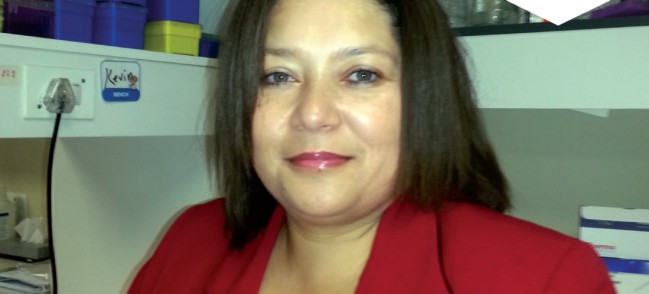Dr Alison September is a pioneer in a pioneering field. A senior research officer in the UCT/Medical Research Council (MRC) Research Unit for Exercise Science and Sports Medicine (ESSM) in the Department of Human Biology, Dr September is at the forefront of genetic studies geared towards identifying the hereditary risk factors underlying soft tissue injuries such as Achilles tendon injuries and anterior cruciate ligament ruptures.
“We are hoping that, by combining all the genetic analysis of the structural components and of the cell signalling regulation, we will be able to get to a model where we can identify the most important biological role players in injury susceptibility,” she explains. This has implications for sports professionals in that, if it turns out they are, by virtue of their genes, at increased risk of a soft tissue injury, they can adapt their training accordingly – to strengthen and not put unnecessary strain on tendons or ligaments.
While currently working with elite athletes, Dr September says the research findings could also be extended to benefit other patients with soft tissue injuries and also to address occupational injuries, such as carpal tunnel syndrome. “I think it’s the tip of the iceberg,” she says. “We haven’t yet looked at the potential effect on other clinical patients, but there are soft tissues throughout your body, so if this risk factor is high, it could have an effect on other clinical phenotypes, such as recovery of a patient from surgery.”
Dr September is now also turning her attention to the topical issue of concussion risks. “We are trying to see, are there genetic elements that contribute to your risk of sustaining a concussion, but more importantly, are there genetic elements which influence your recovery? We want to identify a biomarker which could be used, together with clinical parameters, to diagnose a concussion incident. People don’t always present with clinical symptoms, and they don’t necessarily correlate with the severity of the concussion. So if we can come up with a blood biomarker that confirms that a patient has concussion it would assist with treatment and recovery.”
With a PhD in classical human molecular genetics from UCT, Dr September joined the ESSM in 2005 as a postdoctoral research fellow, drawn to the unit by the pioneering work of Professor Malcolm Collins, head of the Department of Human Biology. “I met him, I collaborated with him, and I thought: ‘This is a dynamic person, I want to be part of that team,’” she says.
She has also benefitted from the Emerging Researcher Programme (ERP), saying it has given her the inspiration to “become bold in my thinking. Just from their excitement about your project and CV you get excited about yourself. You start getting confidence in yourself, which gives you momentum and you want to go with it.”
On a practical level, the ERP has enabled her to publish several papers as a lead author, thereby upping her outputs and helping her to secure her C2 NRF-rating in early 2014.



Comments are closed.